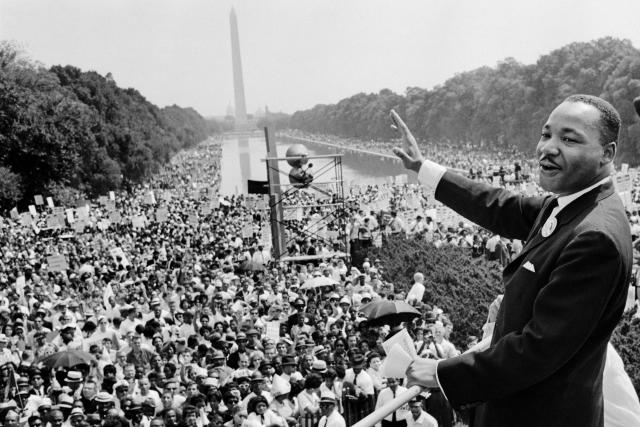Why the metaverse is becoming a popular tool to teach Black history
Share
Explore Our Galleries
Breaking News!
Today's news and culture by Black and other reporters in the Black and mainstream media.
Ways to Support ABHM?
by Claretta Bellamy, NBC News

From watching Martin Luther King Jr. speak to following Black travelers on their journey along Route 66, the metaverse takes users back in time without leaving the present.
Third-grader Mya Alvarado would not be born for another five decades when Martin Luther King Jr. gave his historic “I Have a Dream” speech in 1963. But instead of relying on history books and videos to learn about it, Mya, from Irvington, New Jersey, recently wore her virtual reality headset and transported herself back in time to see and hear King’s speech in the metaverse, via the Time Studios’ project “The March 360.”
What stood out to Mya, 8, was King standing at his podium, surrounded by sparkles while talking about his “dream that his children were treated fairly,” she said…
In an effort to promote a more comprehensive education of Black history among young people, creatives and educators are harnessing new methods like virtual reality. Morehouse College launched its first Black history course in the metaverse this year, virtually taking students on a slave ship, and to the Civil War and World War I battlegrounds where Black soldiers fought. It’s one of countless projects promising to bring users to a moment in time — and with more than 400 million metaverse users per month, there is a solid chance Mya’s experience in January won’t be her last…
A unique way to see the past
Often used for video gaming, the metaverse is a virtual space where people can interact with others in shared digital experiences for learning, leisure or entertainment. Some popular metaverse platforms include The Sandbox and Horizon Worlds, created by Meta, the parent company of Facebook and Instagram. Users gain access into the metaverse through a virtual reality headset, which includes goggles and a joystick that allow them to both see and move freely in the space.
Companies are recreating historic moments too, and Black creatives like artist Gabe Gault are partnering with them to help tell Black heritage stories…
Enjoy the complete article here.
For more Breaking News click here.
For more ABHM galleries click here.









Comments Are Welcome
Note: We moderate submissions in order to create a space for meaningful dialogue, a space where museum visitors – adults and youth –– can exchange informed, thoughtful, and relevant comments that add value to our exhibits.
Racial slurs, personal attacks, obscenity, profanity, and SHOUTING do not meet the above standard. Such comments are posted in the exhibit Hateful Speech. Commercial promotions, impersonations, and incoherent comments likewise fail to meet our goals, so will not be posted. Submissions longer than 120 words will be shortened.
See our full Comments Policy here.